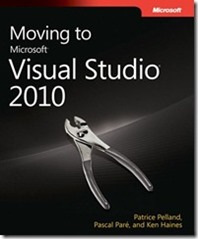Free e-book: Moving to Visual Studio 2010

I moved to Visual Studio 2010 as soon as I got the first version of it and if I’m correct it was even before first public beta. After couple of days playing with Visual Studio 2010 it was clear to me that I want to stay on this platform and I will start using it in real projects as soon as first stable version is out. But there are still a lot of guys who still plan the move or who are thinking about it. I hope this book will help you make your decision.
Table of Contents
I Moving from Microsoft Visual Studio 2003 to Visual Studio 2010
1. From 2003 to 2010: Business Logic and Data
2. From 2003 to 2010: Designing the Look and Feel
3. From 2003 to 2010: Debugging an Application
4. From 2003 to 2010: Deploying an Application
II Moving from Microsoft Visual Studio 2005 to Visual Studio 2010
5. From 2005 to 2010: Business Logic and Data
6. From 2005 to 2010: Designing the Look and Feel
7. From 2005 to 2010: Debugging an Application
III Moving from Microsoft Visual Studio 2008 to Visual Studio 2010
8. From 2008 to 2010: Business Logic and Data
9. From 2008 to 2010: Designing the Look and Feel
10. From 2008 to 2010: Debugging an Application






It seems weird that some Software Engineers are still using Visual Studio 2003 and .NET 1.0/1. Their companies’ customers/users are behind, their companies themselves are behind and Engineers are behind in their career.
I am sure there are large projects that are hard to move to new dev tools because of the size. It may be the whole project stage that may cost a lot of money. But I am sure that there are also guys who are used with tools they have and they actively try to avoid all the changes.
@Phil, I think @DigiMortal (Gunnar) is right. I’ve been working on some projects using VS.NET 2003 and MS SQL Server 2000 just because the entire project was made on these dev.tools and .net 1.1, and there was no need of upgrading to newer .net framework version and newer .net dev.tools. However, it mostly depends of the project and in some cases it might be seamless upgrading your project to .net 3.5/4.0 and work with vs.net 2010. If you start completely new project, then going with VS.NET 2010 / .NET 4.0 would be best since it offers many features that may speedup the development process.
I just wrote a blog post with reference to this one, in order to ‘spread the word’ about this book ;)